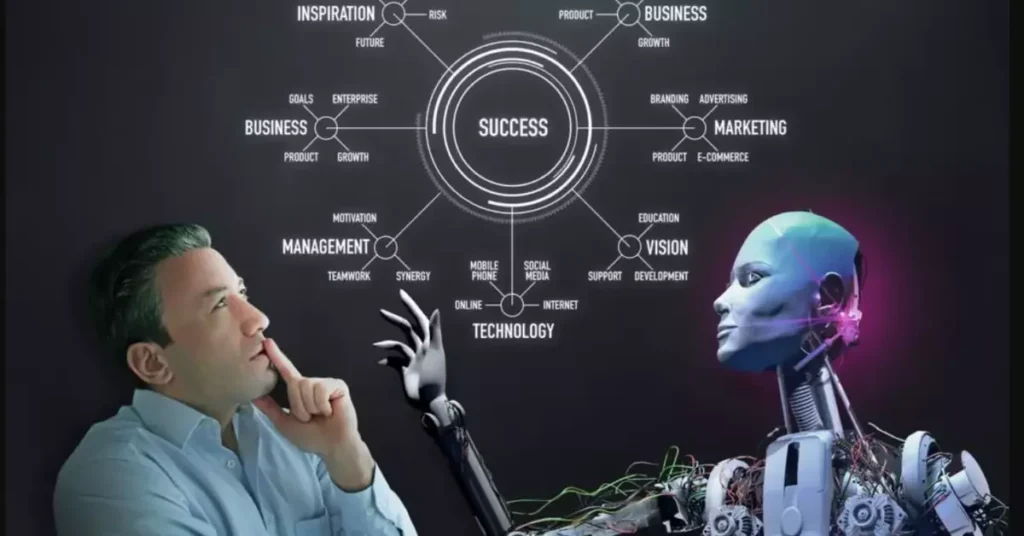Top Jobs AI Is Plotting to Take Over
Top Jobs AI Is Plotting to Take Over, Concerns about technological unemployment are sparked by the fact that artificial intelligence (AI) has the potential to automate a wide range of occupations.
According to research conducted in the United Kingdom, 20–30% of jobs, largely white-collar positions, might be automated by artificial intelligence.
Top Jobs That AI Is Plotting to Take Over, for example, artificial intelligence chatbots such as ChatGPT are able to do repetitive work in a variety of fields, including customer service, legal, educational, and sales positions.
Additionally, the use of AI technologies in healthcare and finance may have an effect on occupations that are connected to these fields.
According to the findings of the study, the top five occupations that are most likely to be affected by partial or complete automation by artificial intelligence are management consulting, business analysis, accounting, money management, and psychology.

Also Read: Ai Photo Feature of Pixel-8
Also Read: Chat GPT Vs Bing’s Chat Bot
Also Read: Is Chat GPT A Threat To Our Jobs
The Impact of Artificial Intelligence on Employment
While it is troubling that artificial intelligence and automation have the potential to eliminate employment held by humans, new study reveals that the effect may be more complicated than previously thought.
Aspects of labor might be transformed in both good and bad ways by artificial intelligence, as opposed to the complete removal of professions.
On the other hand, artificial intelligence does pose a danger to activities that are regular and repetitive and may be encoded in algorithms.
Providing customer service, doing simple data entry, performing administrative work, and even performing certain medical diagnoses might result in a decrease in the requirement for human employment.
On the other hand, rather of completely eliminating occupations, it is possible that certain tasks will merely be transferred from human employment to that of artificial intelligence.
Conversely, artificial intelligence that works in conjunction with humans might potentially provide new chances for jobs that need a high level of expertise.
Workers are able to specialize in more difficult to automate jobs that need flexibility, problem thinking, creativity, and interpersonal skills since AI is able to handle activities that are repetitive.
With the assistance of artificial intelligence in medical scans, for instance, doctors were able to concentrate more on diagnosis and treatment planning.
The use of artificial intelligence trading algorithms by financial analysts to inform higher-level strategy is another area of concentration.
The pressure of repetitious labor is lifted by artificial intelligence and automation, which enables human applications to be created that are more meaningful and effective.
Setting the Workforce Up for an Artificial Intelligence Future
Despite the fact that artificial intelligence (AI) promises to be beneficial, achieving favorable results needs careful deployment and preparation of the workforce.
In addition to the use of AI, organizations are required to provide direction, training, and incentives for their employees to modify their responsibilities.
Employability is improved by retraining programs that instruct workers on how to make use of artificial intelligence capabilities.
It is also necessary for educational institutions to evolve their curricula in order to produce graduates who are prepared to work with artificial intelligence.
In addition, the policy of the government is a factor to consider. Workers who are displaced by automation may benefit from tax incentives that would encourage them to continue their education and expand their abilities.
The creation of future employment opportunities is another benefit of investing in digital infrastructure and developing technologies.
Furthermore, comprehensive labor safeguards prevent the exploitation of demographic groups who are particularly susceptible.
If people work together in a responsible manner, they will be able to prosper alongside the development of artificial intelligence, taking use of its abilities to improve productivity and creativity while avoiding its negative effects.
The realization of this vision, however, calls both initiative and preparation across all sectors of the economy.
We have a tremendous amount of responsibility in managing change, yet the potential for transformation is enormous.

